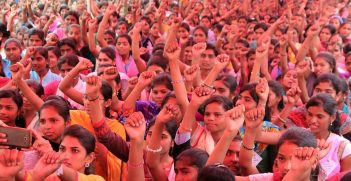Election Tensions: The Fate of Taiwan's LGBTQIA+ Future

While the precarious relationship with the People’s Republic of China often dominates the Taiwan elections, another issue of equal importance has demanded further attention: the future of LGBTQIA+ rights in Taiwan.
Hailing it as a critical showdown between pro-China and pro-independence factions, analysts and commentators are not misguided in highlighting the election’s importance for sovereign rule. However, the reality is that regardless of the outcome, Beijing will likely be more animated than before, and its influence and control over Taiwan much increased.
It is true that Beijing all but froze relations and increased its provocative rhetoric and military drills during Democratic Progressive Party (DPP) leader Tsai Ing-wen’s presidency. It is therefore unsurprising that many are concerned that Beijing will intensify its pressure on Taipei to dangerous levels should Lai Ching-te, Tsai’s Vice President and close DPP ally, win the presidency. Yet, the truth is more nuanced. Even if the more conservative Hou Yu-ih of the Kuomintang (KMT) wins the election and seeks closer economic ties with the mainland, Beijing will continue to increase the island’s economic dependency on the mainland and use all manner of social and military levers to win control of Taiwan.
With Taiwan’s freedoms at stake, the implications for the future of LGBTQIA+ rights are significant. Regionally, such rights still do not share widespread popularity – some still disagree whether it is congruent with “Asian values.” On the mainland, LGBTQIA+ rights remain limited and embattled. While younger generations of LGBTQIA+ Chinese experience more tolerance and exposure to the international queer world, Beijing’s approach to the community remains characterised by a preference for social stability and adherence to traditional values, leading to limited public discourse and recognition of LGBTQIA+ issues. Beijing also fears that the LGBTQIA+ community may provide an opportunity for American influence on–and ultimately infiltration into–Chinese society.
This contrasts starkly with Taiwan’s ongoing strides for equality and progress. In some respects, the journey towards LGBTQIA+ rights in Taiwan has mirrored the island’s metamorphosis into a vibrant democracy, an experience Beijing is surely not likely to appreciate. To be sure, this liberal development has not been without its challenges. An overwhelming majority voted against marriage equality under the Civil Code in a 2018 referendum while also agreeing that the rights of same-sex couples should be protected as well. President Tsai and the ruling DPP cleverly passed legislation in 2019 that created marriage equality outside the Civil Code and granted same-sex couples many of the same rights as heterosexual couples, such as the right to get married and adopt children. This was despite fierce conservative rhetoric by the opposition KMT and various Christian groups.
Transgender rights have also come a long way under the current administration. A 2018 law banned employment and education discrimination against transgender individuals and recognised the right to change legal genders on official documents without gender reassignment surgery. Additionally, the law also ensured access to hormone therapy, mental health services, and employment support.
The legalisation of same-sex marriage was a watershed moment, but it did not signify the end of the long march for equality. Broader societal acceptance remains contentious, and this is reflected in partisan politics.
The candidates vying for the island’s highest office offer contrasting visions for Taiwan’s future, and the future of the LGBTQIA+ community is no exception. The ruling and more progressive DPP has championed LGBTQIA+ rights over the past seven years; it views LGBTQIA+ rights as an important part of the broader “umbrella of democracy.” By contrast, the more conservative KMT has historically opposed such rights, viewing them as in conflict with traditional Taiwanese values. There is much fear that some laws and protections may be reversed in a possible KMT return to power.
The international dimension of Taiwan’s ongoing journey toward LGBTQIA+ rights is compelling. As countries in the region grapple with their own questions around such rights, Taiwan’s approach serves as a template, indeed a beacon of what could be possible in a society that marries traditional Asian values with liberal democratic principles. Beijing must certainly be cognizant of this fact. Its current modus operandi is to severely repress popular rights protests, lest a “colour revolution” begin to take root; a fear it vocally shares with its population as the harbinger of the end of Chinese success.
Indicatively, this election is about more than just Taiwan’s geopolitical positioning. It encapsulates a broader societal debate about the direction in which Taiwan is heading, one where liberal values are increasingly embraced, yet traditional views still hold significant sway. The election is about more than who sits in the Presidential Office in Taipei, the battle over semiconductors, or the likelihood of a cross-strait war. Instead, it is about how Taiwan positions itself in a battle of values against an encroaching mainland determined to end its liberal journey.
Kazimier Lim (he/him) is a public policy consultant based in Sydney. He is a part of the Pacific Forum’s Young Leaders Program and the Australian Institute of International Affairs NextGen Network, and currently sits on the Australian GLBTIQ Multicultural Council. Kazimier holds a Master of International Relations (Advanced) from the Australian National University and has written on Asia, international prestige, and international aviation politics. Follow him on X, formerly known as Twitter.
This article is published under a Creative Commons Licence and may be republished with attribution.





